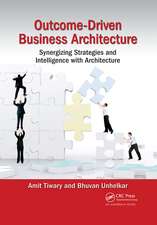Engineering Systems Integration: Theory, Metrics, and Methods
Autor Gary O. Langforden Limba Engleză Hardback – 9 mai 2012
The first book to address the underlying premises of systems integration and how to exposit them in a practical and productive manner, Engineering Systems Integration: Theory, Metrics, and Methods looks at the fundamental nature of integration, exposes the subtle premises to achieve integration, and posits a substantial theoretical framework that is both simple and clear. Offering systems managers and systems engineers the framework from which to consider their decisions in light of systems integration metrics, the book isolates two basic questions, 1) Is there a way to express the interplay of human actions and the result of system interactions of a product with its environment?, and 2) Are there methods that combine to improve the integration of systems? The author applies the four axioms of General Systems Theory (holism, decomposition, isomorphism, and models) and explores the domains of history and interpretation to devise a theory of systems integration, develop practical guidance applying the three frameworks, and formulate the mathematical constructs needed for systems integration.
The practicalities of integrating parts when we build or analyze systems mandate an analysis and evaluation of existing integrative frameworks of causality and knowledge. Integration is not just a word that describes a best practice, an art, or a single discipline. The act of integrating is an approach, operative in all disciplines, in all we see, in all we do.
| Toate formatele și edițiile | Preț | Express |
|---|---|---|
| Paperback (1) | 468.73 lei 43-57 zile | |
| CRC Press – 29 mar 2017 | 468.73 lei 43-57 zile | |
| Hardback (1) | 1168.21 lei 43-57 zile | |
| CRC Press – 9 mai 2012 | 1168.21 lei 43-57 zile |
Preț: 1168.21 lei
Preț vechi: 1460.27 lei
-20% Nou
Puncte Express: 1752
Preț estimativ în valută:
223.57€ • 232.54$ • 184.57£
223.57€ • 232.54$ • 184.57£
Carte tipărită la comandă
Livrare economică 14-28 aprilie
Preluare comenzi: 021 569.72.76
Specificații
ISBN-13: 9781439852880
ISBN-10: 143985288X
Pagini: 406
Ilustrații: 32 b/w images and 6 tables
Dimensiuni: 156 x 234 x 25 mm
Greutate: 0.7 kg
Ediția:New.
Editura: CRC Press
Colecția CRC Press
ISBN-10: 143985288X
Pagini: 406
Ilustrații: 32 b/w images and 6 tables
Dimensiuni: 156 x 234 x 25 mm
Greutate: 0.7 kg
Ediția:New.
Editura: CRC Press
Colecția CRC Press
Public țintă
Professional Practice & DevelopmentCuprins
Overview. Explicate discussion of systems engineering. Foundations of systems integration. Introduction to a theory of systems integration. Frameworks for systems integration. Value, worth, and risk in systems integration. Hierarchal versus heterarchial system decomposition. Coupling, cohesion, and connectivity between elements. Introduction to abstraction and granularity. Emergent behaviors. Systems integration management. Scenario planning for systems integration. System of systems integration. Future research in systems integration.
Notă biografică
Gary O. Langford teaches systems engineering and system integration, and is a practicing systems engineer; a NASA Ames fellow; visiting lecturer in the Aeronautics and Astronautics Department, Stanford University; founder and president of four U.S. corporations (one publicly traded on Nasdaq); owner of an international consulting firm; earlier member of the boards of directors of seven corporations (holding three positions as chairman of the board); executive vice president of a merchant bank; manager of an aerospace systems engineering department; contract research scientist; foreman of a cannery nightshift operation; and lifelong learner. His work of thinking in systems integration spans his education in physics, astrophysics, geophysics, electrical engineering, sociology, business management, and systems engineering. He has served as the principal investigator for contracts and grants from the U.S. Navy, the U.S. Army, the U.S. Air Force, the U.S. National Aeronautics and Space Administration (NASA), U.S. Customs and Border Protection Agency, and the Temasek Defence Systems Institute, Singapore. In addition to extensive work with corporations and universities in the United States, he has engaged in collaborative research with researchers from Australia, Singapore, South Korea, Japan, United Kingdom, Canada, Turkey, and France. Gary Langford is a senior lecturer in the Systems Engineering Department at the United States Naval Postgraduate School and a doctoral candidate at the Defence and Systems Institute, University of South Australia, Australia. He has an AB astronomy degree from the University of California, Berkeley and an MS physics degree from California State University, Hayward. Since 1976, Gary Langford has worked in all facets of systems engineering and systems integration on projects ranging from $200 thousand to $1 billion. His research interests include the creation and sustainment of systems.
Recenzii
"… provides a fundamental approach to a major engineering problem, the integration of large complex systems, which should result in genuinely innovative system design and considerable improvements in reliability and savings at all stages of the system lifecycle."
—Timothy Ferris, Defence and Systems Institute, University of South Australia
—Timothy Ferris, Defence and Systems Institute, University of South Australia
Descriere
The first book to address the underlying premises of systems integration and how to exposit them into a practical and productive manner, this book prepares systems managers and systems engineers to consider their decisions in light of systems integration metrics. The book addresses two questions: Is there a way to express the interplay of human actions and the result of system interactions of a product with its environment, and are there methods that combine to improve the integration of systems? The systems integration theory and integration frameworks proposed in the book tie General Systems Theory with practice.

























